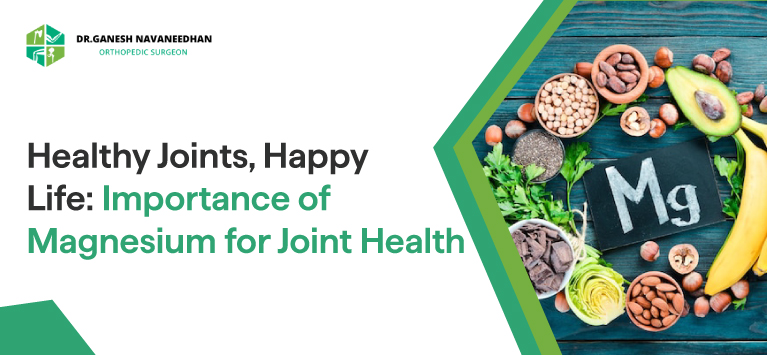- +91 8848509072
-
Sasthamangalam, Trivandrum
Sasthamangalam, Trivandrum

Joints are areas in your body where bones meet and allow you to move and do a lot of work. These parts require attention in order to avoid complications. Magnesium may help with this treatment.
Magnesium has the power to reduce joint swelling, play an important part in bone strength, protect cartilage from future issues, significantly improve joint pain, and even provide relief to adjacent muscles.
Learn more about how magnesium affects joints, its benefits, and how it can help prevent or alleviate joint discomfort. Discover the best methods to eat it for the best outcomes. Stay tuned for further information on how to maximize its benefits.
Magnesium is good for the joints because it protects them, helps them to be stronger, and in turn, provides them with other essential benefits for their daily functioning. Let’s talk in-depth about the benefits that your joints obtain thanks to keeping your doses of magnesium regulated in the body:
To take it correctly, it is important to know how many mg you should take per day; this changes depending on age, and you should check it on the supplement’s own packaging. But begin by seeking tailored advice from a healthcare expert before using magnesium to enhance joint health. A daily dose of 300-400 mg is usually effective. Consume magnesium-rich foods such as almonds, leafy greens, and whole grains.
Start the day with a magnesium-rich breakfast, such as spinach omelettes or porridge with almonds. Consider magnesium supplements, such as capsules or powders, which may be readily included in your daily routine.
Remember, moderation is crucial since too much magnesium can cause gastric problems. Spread out your dose throughout the day for greater absorption and fewer adverse effects.
Stay hydrated since water promotes magnesium absorption. Furthermore, avoid high-fat meals when taking supplements because they may interfere with absorption.
To supplement magnesium’s advantages, engage in low-impact workouts such as swimming or yoga. You may experience better joint flexibility and comfort over time.
Magnesium directly affects joint pain, firstly because it protects the joints in such a way that it prevents these joint pains that you suffer from a malfunction of the bones from occurring or appearing.
In addition, if you have not consumed enough magnesium to prevent these pains from appearing, magnesium, due to the anti-inflammatory function that we have talked about before, can relieve pain when it occurs and strengthen the affected parts again. But besides magnesium, there are other ways to avoid and treat them:
Incorporating magnesium into your daily routine can significantly contribute to healthy joints and a happier life. Its anti-inflammatory properties, bone density improvement, cartilage protection, pain relief, and muscle relaxation benefits make it a vital element in joint care. Balancing magnesium intake through a mix of dietary sources and supplements, along with maintaining proper hydration and engaging in low-impact exercises, can promote joint flexibility and alleviate discomfort. Always adhere to recommended dosages and consult healthcare professionals for personalized guidance. Remember, seeking medical advice and considering other holistic approaches will further enhance your joint health journey.
Copyright © 2024 Dr. Ganesh Navaneedhan. All Rights Reserved. | Designed By Harvee healthcare